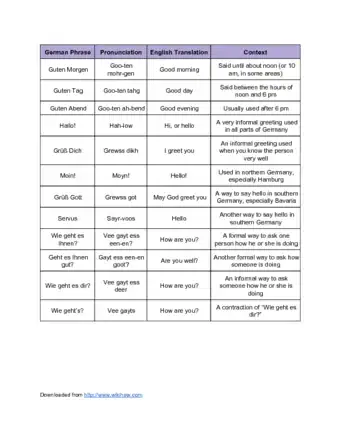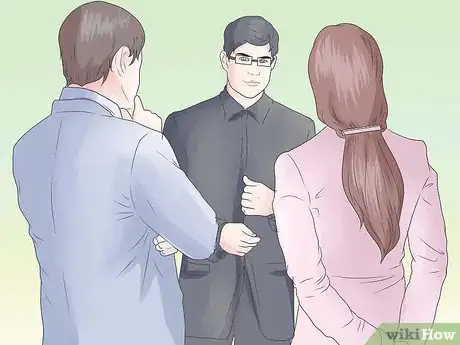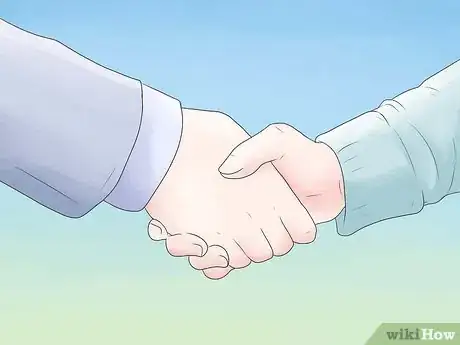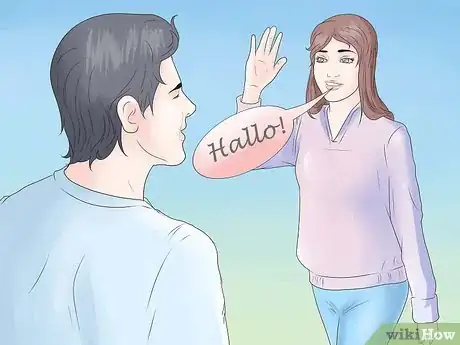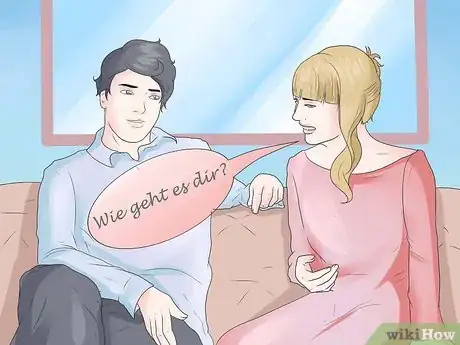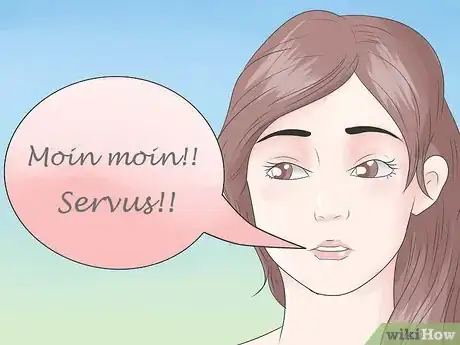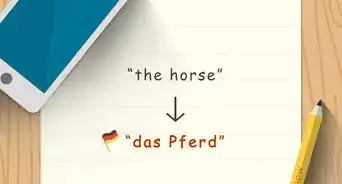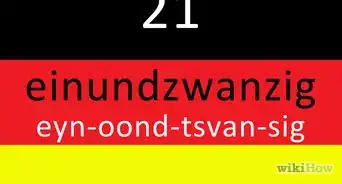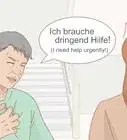wikiHow is a “wiki,” similar to Wikipedia, which means that many of our articles are co-written by multiple authors. To create this article, 35 people, some anonymous, worked to edit and improve it over time.
This article has been viewed 1,394,592 times.
Learn more...
Knowing basic German greetings is important if you are living, vacationing or working in Germany. As with most cultures, German distinguishes between formal greetings and ones you can use with friends and family. This article will tell you how to say hello in German in nearly every way possible.
Steps
Cheat Sheet
Formal German Greetings
-
1Know your listener. Say these phrases when you are greeting business associates and people you do not know well. Most of these greetings relate to the time of day.[1]
- "Guten Morgen!" -- Good morning!
- It is usually used until about noon. In some areas of Germany, it is only said until 10 a.m.
- School children usually say to the teacher "Guten Morgen, Frau/Herr [surname of teacher]." -- Good Morning, Mr(s) [surname of teacher].
- "Guten Tag!" -- Good day!
- This phrase is usually said between the hours of noon and 6 p.m.
- "Guten Abend." -- Good evening.
- This greeting is usually used after 6 p.m
- If you are writing, take note that all nouns in German are capitalized.
- "Guten Morgen!" -- Good morning!
-
2Opt for pleasantries. Often in English, asking a question is a polite way of saying, "Hello!" In German, it is no different.[2]
- "Wie geht es Ihnen?" -- How are you? (formal)
- "Geht es Ihnen gut?" -- Are you well?
- "Sehr erfreut." -- Nice to meet you.
- To respond: "Gut, danke." -- Good, thank you.
"Es geht mir sehr gut." -- I'm very well.
"Ziemlich gut." -- I'm rather well.
- To respond: "Gut, danke." -- Good, thank you.
- If you are asked a question such as this, it is customary to respond with, "Und Ihnen?" -- And you? (formal)
Advertisement -
3Know the proper physical greetings. In every culture or region, there is a different standard of greeting, be it bowing, hugging, or hand-shaking. Germany is a bit different than the rest of Europe.[3]
- People in Germany usually prefer to greet non-family members with handshakes instead of the cheek kissing that is customary in most of Europe; however, cheek kissing is still a common type of greeting in many German-speaking countries.
- The rules regarding the number of kisses to give and knowing when and who to kiss change from place to place. When you meet someone for the first time, you can usually just shake hands. Then just watch how other people interact. You'll quickly recognize the pattern.[4]
Informal Greetings
-
1Use casual phrases when greeting family and friends. Some of the following greetings are used in most regions of Germany.[5]
- "Hallo!" needs no translation and is the most commonly used.
- "Morgen," "Tag," and "'n Abend" are shortened versions of the previous time-related greetings.
- "Grüß Dich" is translated to "I greet you" in English. You only use this greeting if you know the person very well. It can also be a good indicator of where someone lives, as grüß dich is southern dialect.
- "ß" is sometimes represented as "ss" and is pronounced as such.
-
2Go for questions. To ask someone how they are, you have a couple different options (just like in English):[6]
- "Wie geht es dir?" -- How are you? (informal)
- "Wie geht's?" -- How's it going?
- To respond, you can use: "Es geht mir gut." -- I'm fine. or "Nicht schlecht." -- Not bad.
- To throw a question back: "Und dir?" -- And you? (informal)
Community Q&A
-
QuestionHow do I say thank you in German?
 Community AnswerYou can say "danke" which means thank you or thanks.
Community AnswerYou can say "danke" which means thank you or thanks. -
QuestionHow do I say "mom" in German?
 Community AnswerMom is "mama" or "mutti," but Mother is "mutter."
Community AnswerMom is "mama" or "mutti," but Mother is "mutter." -
QuestionHo do I say "All the best" in German?
 Community Answer"Viel Glück!" or " Alles Gute." The last one can also be used when you are at someone's birthday party.
Community Answer"Viel Glück!" or " Alles Gute." The last one can also be used when you are at someone's birthday party.
References
- ↑ https://www.thegermanproject.com/german-lessons/greetings-and-essentials
- ↑ https://learngerman.dw.com/en/hallo/l-37250531/lv
- ↑ https://culturalatlas.sbs.com.au/german-culture/german-culture-greetings
- ↑ https://culturalatlas.sbs.com.au/german-culture/german-culture-greetings
- ↑ https://www.thegermanproject.com/german-lessons/greetings-and-essentials
- ↑ https://learngerman.dw.com/en/hallo/l-37250531/lv
- ↑ https://omniglot.com/language/phrases/german.php
About This Article
To say “hello” in German, you can say, “Hallo,” which is the most commonly used greeting. For a more formal greeting, try using, “Guten Morgen!” in the morning or “Guten Tag,” in the afternoon. If you’re greeting a friend or family member, you could say, “Wie geht’s?” which is similar to asking “How’s it going?” in English. Alternatively, use “Moin Moin!” in Northern Germany or “Servus!” in the south of Germany and Austria. For tips on how to use the appropriate physical greeting, like a handshake, in Germany, read on!
